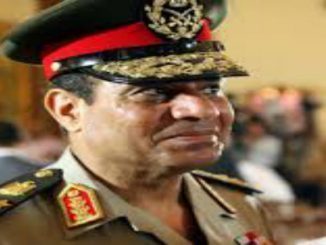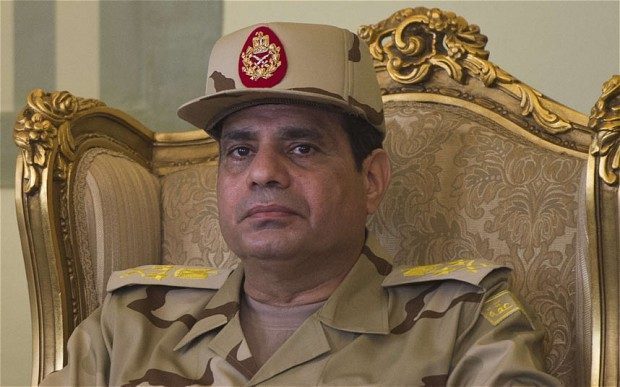
Al-Sisi called the Islamist militants an existential threat and has made security a priority for Egypt.
In a recent TV interview to mark his achievements in office, Sisi said the fight against graft was ongoing and unimpeded. He said that unnamed evil-doers sought to harm Egypt as he always stressed on security and terrorism as the main challenges for Egypt.
In fact, Al-Sisi’s policy seems far from curbing and containing the real essence and causes of terrorism in his race to maintain power over the country. Al-Sisi dismissed claims that Egypt’s jails were bulging with political detainees, saying that 90% of inmates were criminals.
However, Egypt has witnessed a massive crackdown on human rights since the military coup in 2013. Al-Sisi, who claimed that the Egyptians were free to express themselves, has suppressed political opposition and activists most of them belong to Islamic opposition.
In the same context, instead of fighting corruption which is one of the economic causes of poverty and thus behind the spread of terrorism, al-Sisi tends to punish those who are anti-corruption defenders.
The former policeman and judge Hesham Genena, who was appointed to head Egypt’s corruption watchdog in 2012, is now on trial, accused of defaming the state by exaggerating the scale of public sector corruption.
The court has yet to rule on Genena’s case, but he was dismissed from his job as head of the Central Auditing Authority in March.
Genena told authorities last year that corruption had cost the state 600 billion Egyptian pounds ($68 billion) in four years -an estimate he says is based on official reports. A fact-finding committee set up by Sisi said those numbers were misleading, according to state-owned Al-Ahram.
Genena says he has done nothing wrong and his case is being used to warn others of the consequences of speaking out in a country he says is increasingly in the grip of security agencies.
He said, “I am keen on the success of any president because his success is our success… but the attitude I’m seeing of using a security grip or reproducing the police state will not be productive.”
Genena added, “When political parties are absent, NGOs are absent, local media is being crushed, international media too… is that a sign of a healthy environment in which a country can flourish?”
He also added “Corruption is very dangerous,” Genena said.
“Corruption fosters and creates a fertile environment for the growth of terrorism.”
Genena said that state repression has gathered such momentum since Sisi took power that it can only be compared to the 1950s, when Gamal Abdel Nasser’s Free Officers toppled the king, imposed military rule and silenced dissent.
Reuters published a report titled: “In Egypt, Sisi’s star fades as problems piles up” it said, “Three years after general-turned-president Abdel Fattah al-Sisi ousted the Muslim Brotherhood, a crackdown that first targeted opposition activists has now turned on establishment figures like Genena to TV presenters and street performers.“
“Judges who have opposed mass death sentences have been retired. The head of the Press Syndicate and his deputy are standing trial for the first time in the institution’s history,” said Reuters.
It added, “This week, citing alleged visa violations, police deported the British-Lebanese host of a talk show launched after the 2011 uprising which ended Hosni Mubarak’s 30-year rule and raised hopes of a new era of political openness and social justice.”
In the same context, the interior ministry dispersed hundreds of pupils protesting that their exams had been delayed because the questions were leaked based on a law requires the permission of the ministry before any public gathering of more than 10 people.
On the economic level, Reuters reported that despite the Brotherhood won Egypt’s first free parliamentary and presidential elections after the 2011 revolt but faced protests within a year amid power cuts, petrol shortages and resistance from state institutions. “Its supporters see Sisi as a usurper.”
“A broad cross section of the public admired the stern general in dark sunglasses, who promised to restore stability,” said Reuters.
Even after security forces killed hundreds of Brotherhood supporters throughout Egypt’s streets and detained thousands, shops sold out cakes decorated with Sisi’s face. A year on, Sisi was elected president with 97%of the vote (in controversial elections).
However, al-Sisi’s star has faded as he failed to find solutions for the economic crisis that is facing the country. ”Inflation has reached seven-year highs, hard currency is in short supply, the pound is under pressure and economic growth is slowing,” Reuters reports.
Economists have derided what they see as Sisi’s” ill-conceived infrastructure mega-projects, crowned by the costly Suez Canal extension, which has been rushed through under military supervision.”
Sisi said in his TV interview that such projects were needed because of a legacy of underinvestment in infrastructure. But they have failed to create jobs for a rapidly growing population.
Timothy Kaldas, non-resident fellow at the Tahrir Institute for Middle East Policy said, “What were the three main pillars that he promised? Stability, economic growth and security and he has failed on all three counts. “He continued,”So they are doubling down… If they can get away with expanding their repression against high-level targets and keep people in line, why wouldn’t they?”
The question is, “Why al-Sisi continues despite all these failures?” Activists say that without international pressure, Sisi has little incentive to loosen his grip.
Recently, France has sold Egypt billions of dollars’ worth of arms and U.S. military aid has continued as Egypt battles Islamic State militants in Sinai.
Kaldas said, “Nobody is going to twist Egypt’s arm about this now. No one cares. They think it is the best they will get right now.”He said,”Another thing that helps them is that the population has had two uprisings, in their eyes anyway, and after both the situation did not improve. On the contrary, it deteriorated.”
Reuters reported that despite that international community passive stance, the country is already lurching from one crisis to the next,” criticism has mounted on social media and burst into the once-fawning press, as Egyptians have begun to openly mock Sisi’s increasingly rambling speeches.”
Videos appeared online this year in which a group of youths performed skits in the street satirizing Egypt’s crackdown, mocking its foreign policy and skewering its leader. Unfortunately, four members of Atfal al-Shawareh, or Street Children, were behind bars accused of trying to overturn the ruling order and undermine the state. A fifth is out on bail. Social media activists were shocked that a handful of videos by an unknown group could prompt such serious charges.
In addition, more than 200 people were detained in April in connection with protests against the government’s agreement to give away the two Red Sea islands to Saudi Arabia — a subject that featured in Atfal al-Shawareh’s skits. Many have received jail terms or fines but most have since been acquitted.
Mohamed Sadat, who heads the human rights committee in parliament said,”Can you imagine how it is to be a young person in medical college or any other college and be imprisoned for a year or two.” “Will they come out good citizens? Or people full of hatred… without loyalty or belonging to this country?”



